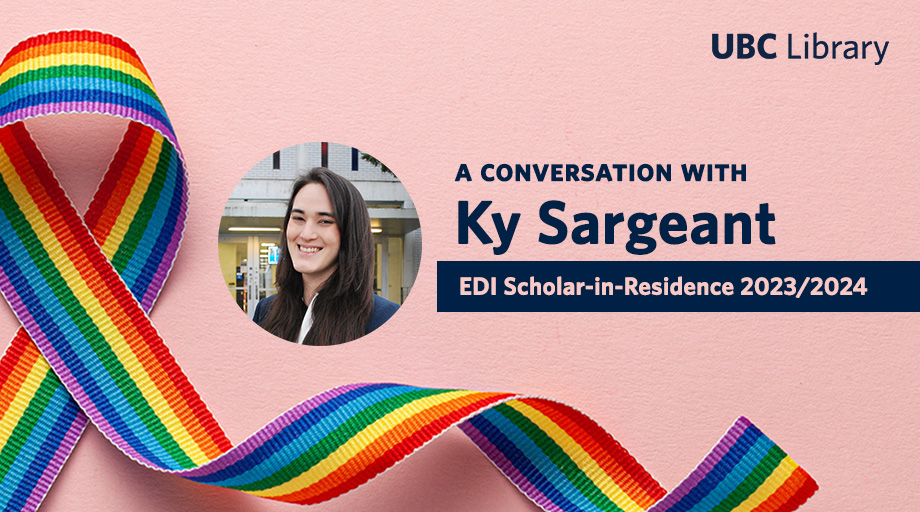
KY SARGEANT,
UBC Library EDI Scholar-in-Residence 2023/2024
Ky Sargeant (she/they) is a professional EDI consultant and educator who brings an empathetic human-centred approach to all of her work, driven by an international lived experience. Having lived and worked in multiple cultures, she has developed a keen ability for compassionate communication and a critical eye toward the structural impacts felt by people of diverse identities. They believe in fostering deep connections with the people they work with and co-creating innovative solutions for inclusion. Read Ky’s full bio.
Q: What have been your biggest professional challenges?
I think the biggest professional challenge I deal with is the intersection of ageism and the systemic pressure against EDI, where even though people say they want to do things, the reality of doing things is so much larger than they can conceptualize. I’ve had experiences where people assume that I don’t understand the complexity of business, because I don’t have the experience or I’m young. And to an extent, they’re right that I don’t have the experience in that world, but I think that oftentimes people don’t know how much experience I do have.
I have had a lot of experiences with large bureaucratic structures. I’ve been in meetings with senior Deans at the UBC Sauder School of Business, negotiating and tackling large political challenges at a high level.
I don’t tell people how old I am because immediately they just discount my opinions. There’s a beautiful quote that I heard at an event recently: “First I have to justify my humanity. Then I have to justify my intelligence. And then I have to justify my ideas in that order.”
Q: What has been the highlight of the last year for you professionally?
The professional highlight of my year was during this Pride season, I was hosting and performing Friday, Saturday and Sunday for the Trans March, the Dyke March and at Pride, back-to-back.
[At the Dyke March] I was there doing stand-up comedy, which is what I do in my spare time… I had a sense that this is the community that I’m working for—this is why I do what I do and why I’ve been doing this work. It’s interesting because I’m in a weird place of possibly transitioning my work and wondering what my direction is on this, if I want to focus more on community activism versus the corporate world. So there’s a lot of conversations about where the impact is most felt. And that moment was a really big highlight of my career to see that this is actually a place where I’m making people laugh and smile. That’s very impactful for me.
“I don’t tell people how old I am because immediately they just discount my opinions.”
Q: Why did you want to participate in the EDI Scholars-in-Residence program?
The trust and the respect that I’ve been given to hold this space [means a lot to me]. Libraries are such important institutions in our society. The fact that I get to contribute to an ongoing collection of knowledge and push these conversations forward, and that I’ve been given full creative liberty to really say things that I wouldn’t be able to say in any other space. I can be a bit more critical of the industry and can be a bit more realistic about what equity and inclusion really mean and the challenges, which I think is so often very hard to talk about when people are focused on such a narrow narrative of progress. These things have to progress in a certain way, and I don’t think that is ever the case with EDI.
“I can be a bit more critical of the industry and can be a bit more realistic about what equity and inclusion really mean and the challenges, which I think is so often very hard to talk about when people are focused on such a narrow narrative of progress.”
Q: In your consultation sessions with UBC faculty, staff or students, what topics would you love to discuss or what questions would you love to get?
The questions that I want to [talk about] revolve a lot around happiness. What are the things that bring them joy? What are the things that keep them waking up every day? What are the things that keep them in this field that is designed to crush their spirit? That’s the conversation that I really want to have. And that’s the conversation that I hope to draw out. [I’d like to] create a space where academics—students and faculty—can comment and just be real about the fact that this work is imperfect and it’s never going to be perfect.
Q: Are there any resources at the library that you’re hoping to access while you’re here?
The fact that I get access to the library databases. I’m looking forward to talking with some of the librarians to get some help with research because [my talk this] semester is trying to find the intersection of like performance art, comedy and equity and building connection for inclusive progress.
The Equity, Diversity, and Inclusion (EDI) Scholars-in-Residence program is open to scholars who hold degrees in any discipline. Residency at UBC’s Irving K. Barber Learning Centre allows Scholars to participate in collaborative and interdisciplinary public programming with a clear impact on equity, diversity, and inclusion. For more information, visit the program website.